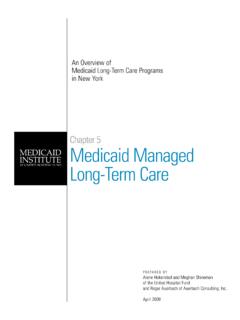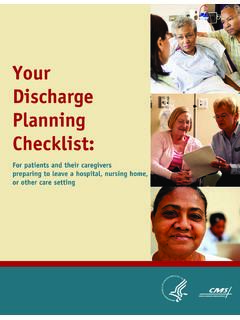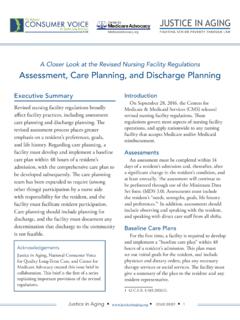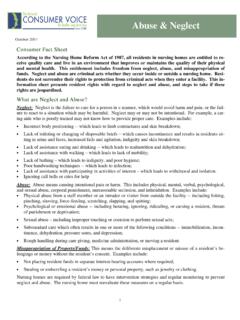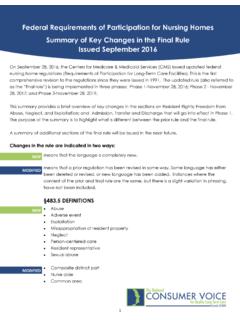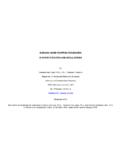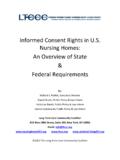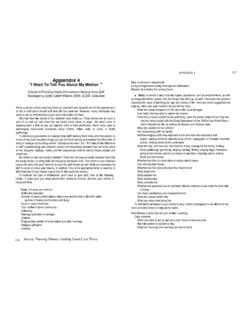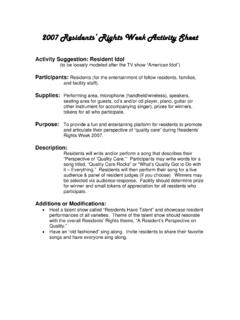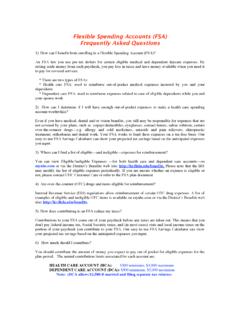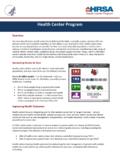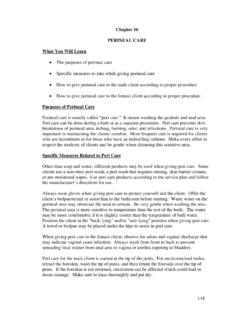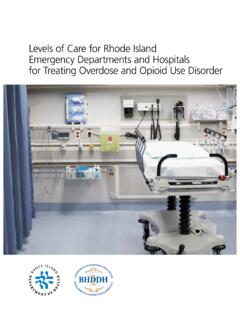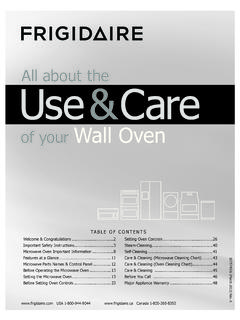Transcription of Federal Requirements: Dementia Care & Use ... - …
1 Federal requirements & Regulatory Provisions Relevant to Dementia care & The Use Of Antipsychotic Drugs By: Richard J. Mollot, Executive Director Daniel Butler, Public Policy & Law Intern Long Term care Community Coalition 242 West 30th Street, Suite 306, New York, NY 10001 2012 The Long Term care Community Coalition 2 Federal requirements : Dementia care & Use of Antipsychotic Drugs Table of Contents Federal LAW 3 Federal REGULATION & OVERSIGHT 3 TRANSPARENCY 3 PROVIDER TRAINING 4 SURVEYOR TRAINING 4 GUIDANCE: ENFORCEMENT OF MINIMUM STANDARDS 4 THE PRINCIPAL F-TAGS RELATED TO ANTIPSYCHOTIC DRUG USE: F-329 & F-222 5 F -329 FREE FROM UNNECESSARY DRUGS - 42 CFR (L)(2)(I, II) 5 F-222 RIGHT TO BE FREE FROM CHEMICAL RESTRAINTS - 42 CFR (A) 5 ADDITIONAL F-TAGS RELEVANT WHEN ANTIPSYCHOTIC DRUGS ARE USED INAPPROPRIATELY 6 F-154 RIGHT TO BE FULLY INFORMED - 42 CFR (B)(3) AND (D)(2) 6 F-155 RIGHT TO REFUSE TREATMENT OR [PARTICIPATION IN EXPERIMENTAL] RESEARCH - 42 CFR (B)(2)(4) 7 F-223 RIGHT TO BE FREE FROM ABUSE - 42 CFR (B) 7 F-240 FACILITY PROMOTES/ENHANCES QUALITY OF LIFE - 42 CFR 7 F-241 DIGNITY - 42 CFR (A) 8 F-248 ACTIVITY PROGRAM MEETS INDIVIDUAL NEEDS - 42 CFR (F)(1)
2 8 F-250 MEDICALLY RELATED SOCIAL SERVICES - 42 CFR (G) 8 F-272 RESIDENT ASSESSMENT - 42 CFR AND 42 CFR (B)(1) 9 F-279 DEVELOPMENT OF COMPREHENSIVE care PLANS 42 CFR (K)(1)(I, II) 10 F-280 OF COMP care PLAN 42 CFR (D)(3) AND 42 CFR (K)(2) 11 F-281 SERVICES MEET PROFESSIONAL STANDARDS OF QUALITY 42 CFR (K)(3)(I) 12 F-282 care PROVIDED BY QUALIFIED PERSONS IN ACCORDANCE WITH PLAN OF care 42 CFR (K)(3)(II) 13 F-309 NECESSARY care FOR HIGHEST PRACTICABLE WELL BEING - 42 CFR 13 F-310 ACTIVITIES OF DAILY LIVING ( ADL ) DO NOT DECLINE UNLESS [THE DECLINE IS] UNAVOIDABLE - 42 CFR (A)(1)(I V) 13 F-319 MENTAL/PSYCHOSOCIAL TREATMENT - 42 CFR (F)(1) 14 F-320 NO DEVELOPMENT OF MENTAL PROBLEMS - 42 CFR (F)(2) 14 F-353 SUFFICIENT NURSING STAFF ON 24-HOUR BASIS - 42 CFR (A)(1) 15 F-385 RESIDENTS care SUPERVISED BY PHYSICIAN - 42 CFR (A)(1, 2) 15 F-428 DRUG REGIMEN REVIEWED MONTHLY - 42 CFR (C)(1) 15 F-490 FACILITY ADMINISTERED EFFECTIVELY 42 CFR 16 F-498 PROFICIENCY OF NURSE AIDES 42 CFR (F) 16 F-501 RESPONSIBILITIES OF MEDICAL DIRECTOR 42 CFR (I)(1, 2)(I, II) 17 APPENDIX: FURTHER GUIDANCE & INFORMATION RELATING TO F-329 18 Federal CODE 18 INTENT 19 GRADUAL DOSE REDUCTION.
3 CONSIDERATIONS SPECIFIC TO ANTIPSYCHOTICS 19 CRITERIA FOR COMPLIANCE 20 CRITERIA FOR NONCOMPLIANCE 20 Acknowledgement: The authors would like to thank Michael Connors of the California Advocates for Nursing Home Reform for his valuable review and comments that contributed to the development of this report. Long Term care Community Coalition Federal requirements : Dementia care & Use of Antipsychotic Drugs 3 Federal Law The Omnibus Budget Reconciliation Act of 1987 contains the Nursing Home Reform Law, legislation enacted to improve nursing home The Reform Law requires skilled nursing facilities receiving Federal funding for Medicare and/or Medicaid to conform to specific standards of care , including the requirement that nursing staff help residents attain or maintain the highest practicable physical, mental, and psychosocial well-being of each individual resident.
4 The emphasis on patient-centered care was intended to reduce widespread problems in long term care facilities, like abuse and neglect, and improve quality of life. Unfortunately, many of the reforms have not been fully implemented. The widespread inappropriate use of antipsychotics in nursing homes across the country is, in many ways, emblematic of weaknesses in implementation of the Reform Law, such as in its standards regarding freedom from unnecessary drugging; freedom from chemical restraints; and rights to be informed about, participate in and refuse treatment. Federal Regulation & Oversight The Centers for Medicare and Medicaid Services (CMS) has recently begun a campaign to address problems of antipsychotic drugging in nursing homes.
5 The campaign was launched in March 2012 and it includes education and outreach to providers and consumers as well as strengthening oversight and provider accountability for providing appropriate, resident-centered Dementia care . CMS s first goal is to decrease the use of antipsychotics in nursing homes nationwide by 15% in Following is an overview of Federal (CMS) efforts to improve nursing home quality and accountability that relate (or are relevant to) the campaign to decrease inappropriate use of antipsychotic drugs in nursing homes. Transparency Nursing Home Compare, 3 part of the website, contains information about every Medicaid and Medicare-certified nursing home in the United States.
6 The public can view information about individual facilities such as the facility s staffing levels (self-reported, as of October 2012), measures that indicate a facility s qualities in certain categories (also self-reported), the dates and results of recent inspections, and the level and frequency of penalties against a specific facility. The public can also compare these statistics against statewide and national averages. 1 Nursing Home Reform Law, 42 1395i-3(a)-(h), 1396r(a)-(h) (Medicare and Medicaid, respectively) (December 1987). The Reform Law s text is available at: #42 2 Goals for 2013 and beyond are expected but have not been announced as of October 2012.
7 3 Nursing Home Compare website available at: 4 Federal requirements : Dementia care & Use of Antipsychotic Drugs As of July 2012, CMS has added two important new categories of quality measures information for nursing homes on the Nursing Home Compare website related to antipsychotic drugging. The public can view (1) the percent of short-stay residents who newly received an antipsychotic medication and (2) the percent of long-stay residents who received an antipsychotic medication. As with other categories in Nursing Home Compare, the public can compare these statistics for nursing homes they select with state and national averages. Provider Training CMS is developing a series of training videos for nursing facilities called Hand in Hand, emphasizing person-centered care and prevention of abuse.
8 The videos are expected to be distributed to nursing homes and state oversight agencies nationwide in the fall 2012. If they are made available to the public LTCCC will post a link to them on our page dedicated to Dementia care and antipsychotic drug use: Surveyor Training CMS is developing a training program for surveyors on antipsychotic drugging and Dementia care . The program will be mandatory for all surveyors. As of September 2012 the program is still in the development phase. LTCCC will post further information and a link at if the training is made available to the public. Guidance: Enforcement of Minimum Standards CMS provides nursing home surveyors (inspectors) with a system to help them identify relevant criteria for evaluating whether a nursing home is meeting quality of care , quality of life, safety and other standards.
9 Based on the law and regulations, this system is comprised of F-Tags (data tags used to identify specific Federal nursing home regulations) and guidance to help surveyors understand the regulatory requirements and how to evaluate for compliance with them. F-Tags are cited in the Statements of Deficiencies (SODs, also known as Form 2567) that are the written record of a surveyor s findings of a facility s failure to comply with one or more standard. The SODs for every nursing home are now posted on Nursing Home Compare (as noted above, under Transparency ). Following is an overview of the F-Tags that are or may be relevant when antipsychotic drugs are administered inappropriately.
10 Each F-Tag description includes its specific citation in the Code of Federal Regulations (CFR), followed by the relevant text from the code and a description of how the F-Tag is relevant in the context of antipsychotic drug use. Long Term care Community Coalition Federal requirements : Dementia care & Use of Antipsychotic Drugs 5 The Principal F-Tags Related to Antipsychotic Drug Use: F-329 & F-2224 F -329 Free from Unnecessary Drugs - 42 CFR (l)(2)(i, ii)5 - (2)(i): Residents who haven t used antipsychotics are not given them unless antipsychotic drug therapy is necessary to treat a specific condition as diagnosed/documented in the clinical record, and - (2)(ii): Residents who use antipsychotics receive gradual dose reductions, and behavioral interventions (unless clinically contradicted) in an effort to discontinue these drugs.
